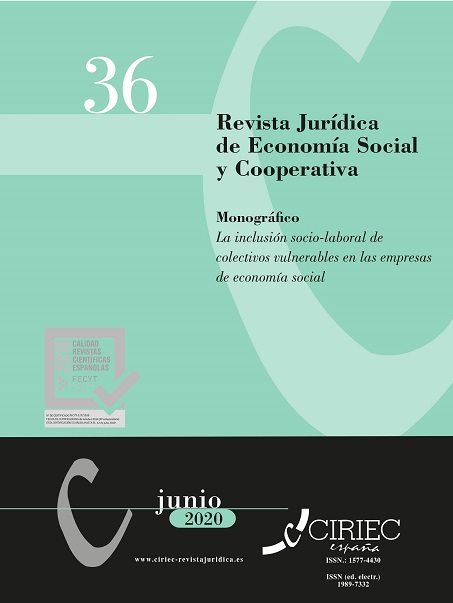The work integration social enterprises in Greece
DOI:
https://doi.org/10.7203/CIRIEC-JUR.36.17289 Abstract
Abstract
The present paper focuses on the available legal forms with work integration as their explicit purpose in the Greek legislature and outlines their main traits on the basis of the EMES (European Research Network) nine criteria of social enterprises. Their thus far implementation is also discussed, including the challenges and shortcomings that WISEs have faced in the Greek context.
The main findings of the study indicate a dominance of the cooperative form for the WISEs under the Greek context. More specifically, the legislator imposes a percentage of members coming from the target group, perceiving in that way mutuality and solidarity as rather intertwined, since the WISEs’ explicit aim of work integration of the disadvantaged people is mainly achieved by joining the cooperative. Despite the supportive measures for the WISEs, the implementation of the thus far public policies has not been effective in further promoting such a model of enterprise.
 Downloads
Downloads
 References
References
Defourny, J: Introduction: from third sector to social enterprise, in: Borzaga, C. & Defourny, J. (eds). The emergence of social enterprise, London & New York, 2001, pp. 1-28.
Defourny, J. &Nyssens, M.: The EMES approach of social enterprise in a comparative perspective, Working Paper no. 12/03, EMES European Research Network, Belgium, 2012.
Spear, R. & Bidet, E.: “Social enterprise for work integration in 12 European countries: A descriptive analysis”, Annals of Public & Cooperative Economics, Vol. 76, no º 2, June, 2005, pp. 195-231.
Davister, C., Defourny, J. & Gregoire, O.: Work integration social enterprises in the European union: An overview of existing models, WP no. 04/04, EMES European Research Network, Belgium, 2004.
Stefanakis, G.: Social cooperatives of limited liability (SCLL), a cooperative experiment in progress. The example of the SCLL of West Thessaloniki [Κοινωνικοί συνεταιρισμοί περιορισμένης ευθύνης, ένα συνεταιριστικό πείραμα σε εξέλιξη. Το παράδειγμα του ΚΟΙ.Σ.Π.Ε. Δυτικής Θεσσαλονίκης], Aristotle University of Thessaloniki, 2010.
Adam, S.: “Social exclusion and work integration: Social cooperatives for people with mental health problems in Greece”. Ciriec, Working Paper no. 08, Université de Liège, 2014.
Papadopoulos, T. & Roumpakis, A.: The Greek welfare state in the age of austerity: Anti-social policy and the politico-economic crisis, in: Kilkey, M, Ramia, G. & Farnsworth, K.: Social Policy Review, Bristol, 2012, pp. 205-230.
Explanatory memorandum of the draft law "Development and modernization of the mental health services and other provisions” [ Ανάπτυξη και εκσυγχρονισμός των Υπηρεσιών Ψυχικής Υγείας και άλλες διατάξεις], Ministry of Health, Athens, 1999.
Explanatory memorandum of the draft law “Modernisation and reform of the legal framework of private clinics, establishment of National Public Health Agency, establishment of the National Cancer Institute and other provisions” [Εκσυγχρονισμός και Αναμόρφωση Θεσμικού Πλαισίου Ιδιωτικών Κλινικών, Σύσταση Εθνικού Οργανισμού Δημόσιας Υγείας, Σύσταση Εθνικού Ινστιτούτου Νεοπλασιών και λοιπές διατάξεις.] Ministry of Health, Athens, 2019.
Douvitsa I.: Greek cooperative legislation during the post-crisis years: Between companization and socialization. ICA Research International Conference, Almeria, Spain, 24-27 May 2016.
Defourny, J.: The EMES “ideal-type” social enterprise as a compass. 4th EMES International Research Conference on Social Enterprise. University of Liège, July 1-4 2013.
Adam, S., Kornilakis, A. & Kavoulakos, K.I.: The institutional framework of the social solidarity economy in Greece: The experience of the public consultation and a critical assessment of the law 4430/2016 [Το θεσμικό πλαίσιο της Κοινωνικής Αλληλέγγυας Οικονομίας στην Ελλάδα: η εμπειρία της δημόσιας διαβούλευσης και μια κριτική αποτίμηση του νόμου 4430/2016]. Thessaloniki, 2018.
Special Secretary of Social and Solidarity Economy: Annual Report, Ministry of Labour, Social Security and Social Solidarity, Athens, 2018.
Adam, S.: “Social and solidarity economy and the crisis: Challenges from the public policy perspective”, Journal of Economics and Business, Vol. XXI, Nos 1-2, pp. 223-243.
Tsiomidou, E.: Women’s agricultural cooperatives: An institution in need of proposing a new policy [Γυναίκειοι αγροτικοί συνεταιρισμοί: Ένας θεσμός που επιζητά νέα πολιτική πρόταση]. Ministry of Agriculture and Food, Athens, 2016.
Downloads
Published
How to Cite
-
Abstract521
-
PDF (Español)383
Issue
Section
License
Esta obra está bajo la licencia Reconocimiento-NoComercial-SinObraDerivada 3.0 de Creative Commons.
El Copyright será de CIRIEC-España, revista jurídica de economía social y cooperativa, a los solos efectos de favorecer la difusión de los artículos publicados (firmar contratos de difusión, de integración en bases de datos, etc.). Los autores también mantienen el copyright sobre su obra y pueden depositar su artículo en el formato electrónico oficial de la revista en su página web personal y en los repositorios institutionales de su grupo de investigación. No obstante, se autoriza la reproducción y distribución de todos los artículos publicados, siempre que no se modifique el contenido y se indique su origen (CIRIEC-España, revista jurídica de economía social y cooperativa, número y dirección electrónica del documento o DOI). El envío de un artículo a CIRIEC-España, revista jurídica de economía social y cooperativa supone la aceptación de estas condiciones.
Carta de derechos de autor [Link a la carta]



